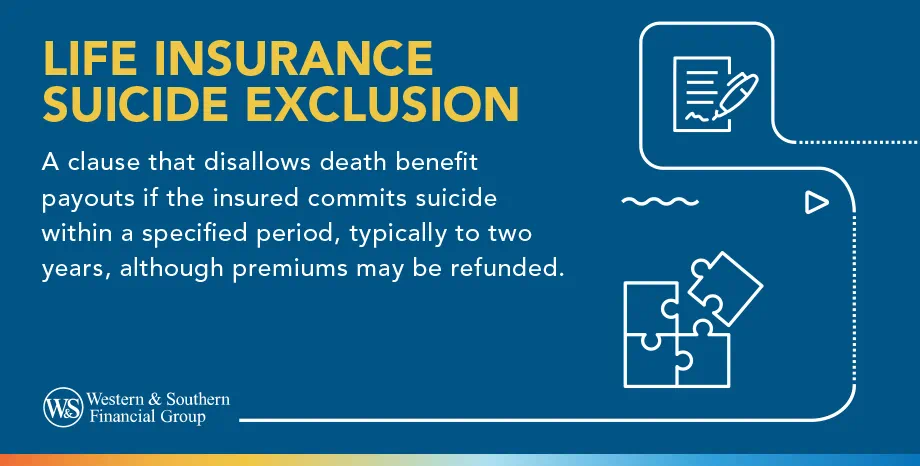

Key Takeaways
- The suicide exclusion clause denies payouts for suicide within the first two years, but premiums are usually refunded.
- If a claim is filed for a suicide-related death, insurers investigate medical records, the death certificate, and policy timelines to determine eligibility.
- Switching to a new policy restarts the exclusion period, but renewing or converting an existing policy does not.
- State laws, employer life insurance, and military benefits may allow full payouts, affecting suicide exclusion rules.
- If a claim is denied under the suicide clause, beneficiaries can pursue legal options, explore alternative financial resources, or consider other insurance policies.
Understanding the Life Insurance Suicide Exclusion
The suicide exclusion clause is a provision in most traditional life insurance policies that limits or denies the death benefit payout if the insured dies by suicide within a specific time period, typically one to two years from the policy’s start date.1 This helps protect the insurance company against financial risk by preventing the coverage of individuals who may have immediate plans to end their lives.
Life insurance is designed to provide financial support to beneficiaries in the event of the policyholder’s passing and includes provisions such as suicide exclusions to help mitigate risk. To prevent adverse selection (where someone might purchase a policy to commit suicidal death for financial reasons), insurance companies include a suicide exclusion clause.
If a policyholder dies by suicide during the exclusionary period, the insurer may refund the premiums paid, but this varies by policy and state regulations. Policyholders should review their specific contract terms to understand how this provision applies to them.
The suicide clause is common across different types of life insurance policies, including:
- Term Life Insurance – This applies to the policy’s initial term.
- Whole Life Insurance – The exclusion typically applies only to the first few years.
- Universal Life Insurance – These are similar rules to whole life insurance.
How the Suicide Exclusion Works in Life Insurance Policies
The suicide exclusion clause helps protect the insurance provider and the integrity of the insurance. Here’s how it generally works:
1. Exclusionary Period: The Waiting Period for Coverage
The exclusionary period is when the suicide exclusion is in effect, typically one to two years after the policy is issued. The duration of this period can vary by insurer and the specific policy, so policyholders must review their policy documents.
During the exclusionary period, if the insured commits suicide, the insurance company is not obligated to pay out the death benefit. Instead, it often refunds the premiums that the policyholder has paid up until the point of death. This refund helps insurers while providing financial relief to the beneficiaries, though significantly less than what would have been available through a death benefit payout.
2. Claim Investigation Process
If the exclusionary period has passed, and the insured has passed away due to suicide, then the primary beneficiary may file a death claim. When a claim is submitted following a suicidal death, the insurance company typically:
- Review the death certificate (how the insured died), medical records, and coroner reports.
- Investigates any history of mental health treatment.
- Determines whether the death occurred within the exclusionary period.
If the insurer determines that the suicide clause applies, they may deny the death benefit claim and issue a claim denial letter. However, beneficiaries may have the right to contest this decision under certain circumstances, such as misclassification of the cause of death or policy misinterpretation. Then, the insurance company will proceed with the standard claims process.
3. Does the Exclusion Reset If You Change Policies?
If a policy is converted or renewed under its existing terms, the suicide exclusion may not reset. However, if a new policy is purchased, a new suicide exclusion period may apply. Policyholders should consult their insurance professional at the life insurance company for clarification based on their specific contract.
Make sure to understand the process and how the suicide exclusion clause works. Consult with a financial representative for assistance in the claim decision process.
Exceptions & Variations in Suicide Exclusions
Although the suicide clause is standard in most policies, key variations depend on state laws, policy type, and insurer rules. Carefully examine your policy to familiarize yourself with the specific rules and stipulations.
State Regulations That Impact Suicide Clauses
Some states impose restrictions on suicide clauses, such as limiting the exclusionary period or requiring insurers to prove intent before denying a claim. Examine the regulations governing your state's insurance policies.
Employer-Sponsored Life Insurance Plans
Employer-sponsored life insurance policies may have different provisions compared to individual policies. Some group life insurance policies do not include a suicide exclusion, but this varies based on the insurer and employer’s plan terms. Employees should review their policy documents or consult their benefits administrator for details. Employees should understand their employer's policy terms, which vary by organization and insurer. If the employer pays for coverage, suicidal death may still be eligible for a death benefit.
Military Life Insurance (SGLI)
Servicemembers' Group Life Insurance (SGLI) does not include a suicide exclusion clause, meaning beneficiaries receive entire life insurance proceeds regardless of the cause of death.
Accidental Death Insurance
If a policyholder has accidental death coverage, it typically does not cover suicide, as it is considered an intentional act rather than an accident.
How the Suicide Clause Affects Beneficiaries
If a suicidal death occurs within the exclusionary period, beneficiaries may face claim denial and financial uncertainty.
Receiving a Claim Denial Letter
If the insurer denies the death benefit payout, beneficiaries may receive a claim denial letter explaining the reason. However, this decision is sometimes contestable if:
- The death was misclassified as suicide when it was an accidental death.
- The policy was beyond the exclusionary period at the time of death.
- State laws override the insurer’s decision.
Legal Options for Contesting a Denied Life Insurance Claim
If you believe a life insurance policy was unfairly denied, consulting a life insurance dispute lawyer can help. Legal experts can:
- Review the policy terms.
- Challenge the insurer’s ruling if there is insufficient proof of intent.
- Pursue legal action for wrongful denial.
Alternative Financial Resources
If an insurance claim is denied, some other financial options include:
- Retirement Accounts or Estate Assets: Beneficiaries may have access to financial resources such as 401(k) plans and IRAs left by the deceased. However, tax treatment and distribution rules vary, and beneficiaries should consult a financial advisor for guidance.
- Government Survivor Benefits: Check for eligibility for Social Security death benefits or veteran's benefits, which can ease financial burdens in specific circumstances.
- Other Insurance Policies: Review any additional insurance policies the deceased may have held, such as critical illness insurance or accidental death and dismemberment coverage, which can provide complementary payouts.
- Personal Savings: Access personal savings to help manage immediate expenses and financial needs.
Can You Still Get Life Insurance If You Have a History of Mental Health Issues?
A history of mental health conditions does not automatically disqualify someone from getting life insurance coverage, but it can impact approval and premium rates.
How Mental Health History Affects Underwriting
During underwriting, insurance companies assess the risk of insuring an individual based on various factors, such as:
- The severity of the condition (depression, anxiety, etc.).
- Whether the individual has received consistent treatment.
- Any past hospitalizations or suicide attempts.
Life Insurance Options for People With Mental Health Conditions
If one life insurance option doesn't meet your needs, don't worry. There are several alternative policies available to assist you:
- Traditional Life Insurance – Available but may have higher premiums.
- Guaranteed Issue Life Insurance – No medical exam required but has lower payouts.
- Group Life Insurance – Employer-sponsored plans often require no medical underwriting.
Steps to Take If You Have Concerns About the Suicide Exclusion
1. Review Your Life Insurance Policy
- Check your policy’s suicide exclusion period.
- If unclear, contact your insurance professional for clarification.
2. Consider Additional Coverage
- Group life insurance from your employer may provide suicide coverage without exclusions.
- Accidental death policies may cover other types of unexpected fatalities.
3. Consult a Life Insurance Professional
A licensed insurance professional can help you find a policy that aligns with your needs and minimizes exclusion risks.
4. Seek Mental Health Support
If you are concerned about mental health and its impact on life insurance, seeking professional support can improve long-term eligibility. Many insurers view ongoing treatment as a positive factor when assessing applicants.
Conclusion
The suicide exclusion clause is vital in life insurance policies, safeguarding insurance companies and ensuring fair risk management. It’s important for policyholders and beneficiaries to understand how these clauses operate, the exclusion period, and how to appeal claim denials.
If policy terms are unclear, consult an insurance professional or a life insurance dispute attorney for complete protection.
Understand how the suicide exclusion affects life insurance benefits. Get a Free Life Insurance Quote
Frequently Asked Questions
What type of death is not covered by insurance?
What voids a life insurance policy?
What are the disadvantages of exclusion clauses?
What is the difference between the contestability period and the exclusionary period?
Sources
- Does Life Insurance Pay for Suicidal Death? https://www.wallaceinsurancelaw.com/does-life-insurance-pay-for-suicidal-death/.
















































